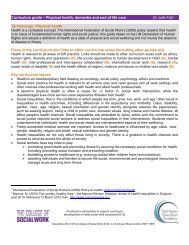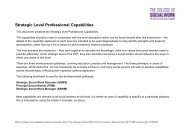Mapping of the PCF against HPC standards of proficiency
Mapping of the PCF against HPC standards of proficiency
Mapping of the PCF against HPC standards of proficiency
You also want an ePaper? Increase the reach of your titles
YUMPU automatically turns print PDFs into web optimized ePapers that Google loves.
eliability and validity <strong>of</strong> information from different<br />
sources<br />
information and knowledge to make recommendations or<br />
modify <strong>the</strong>ir practice<br />
6.4 Demonstrate a capacity for logical, systematic, critical 11 be able to reflect on and review practice<br />
and reflective reasoning and apply <strong>the</strong> <strong>the</strong>ories and<br />
techniques <strong>of</strong> reflective practice<br />
11.1<br />
understand <strong>the</strong> value <strong>of</strong> critical reflection on practice and <strong>the</strong><br />
need to record <strong>the</strong> outcome <strong>of</strong> such reflection appropriately<br />
6.5 Know how to formulate, test, evaluate, and review 1.4 be able to recognise and respond appropriately to unexpected<br />
hypo<strong>the</strong>ses in response to information available at <strong>the</strong><br />
situations and manage uncertainty<br />
time and apply in practice<br />
11.2 recognise <strong>the</strong> value <strong>of</strong> supervision, case reviews and o<strong>the</strong>r<br />
methods <strong>of</strong> reflection and review<br />
6.6 Begin to formulate and make explicit, evidence-informed 4.1 be able to assess a situation, determine its nature and severity<br />
judgements<br />
and call upon <strong>the</strong> required knowledge and experience to deal<br />
with it<br />
4.3 recognise that <strong>the</strong>y are personally responsible for, and must be<br />
able to justify, <strong>the</strong>ir decisions and recommendations<br />
7. Intervention and Skills: Use judgement and authority to intervene with individuals, families and communities to<br />
promote independence, provide support and prevent harm, neglect and abuse<br />
Social workers engage with individuals, families, groups and communities, working alongside people to assess and intervene. They<br />
enable effective relationships and are effective communicators, using appropriate skills. Using <strong>the</strong>ir pr<strong>of</strong>essional judgment, <strong>the</strong>y<br />
employ a range <strong>of</strong> interventions: promoting independence, providing support and protection, taking preventative action and<br />
ensuring safety whilst balancing rights and risks. They understand and take account <strong>of</strong> differentials in power, and are able to use<br />
authority appropriately. They evaluate <strong>the</strong>ir own practice and <strong>the</strong> outcomes for those <strong>the</strong>y work with.<br />
7.1 Identify and apply a range <strong>of</strong> verbal, non-verbal and<br />
written methods <strong>of</strong> communication and adapt <strong>the</strong>m in line<br />
with peoples’ age, comprehension and culture<br />
Final <strong>Mapping</strong> <strong>of</strong> <strong>the</strong> <strong>PCF</strong> <strong>against</strong> SoPs v2 November 2012 ©The College <strong>of</strong> Social Work 2012 2-4 Cockspur Street London SW1Y 5BH Company No.0749939<br />
8<br />
8.1<br />
8.4<br />
be able to communicate effectively<br />
be able to use interpersonal skills and appropriate forms <strong>of</strong><br />
verbal and non-verbal communication with service users and<br />
carers and o<strong>the</strong>rs<br />
understand how communication skills affect <strong>the</strong> assessment <strong>of</strong><br />
and engagement with service users and carers












